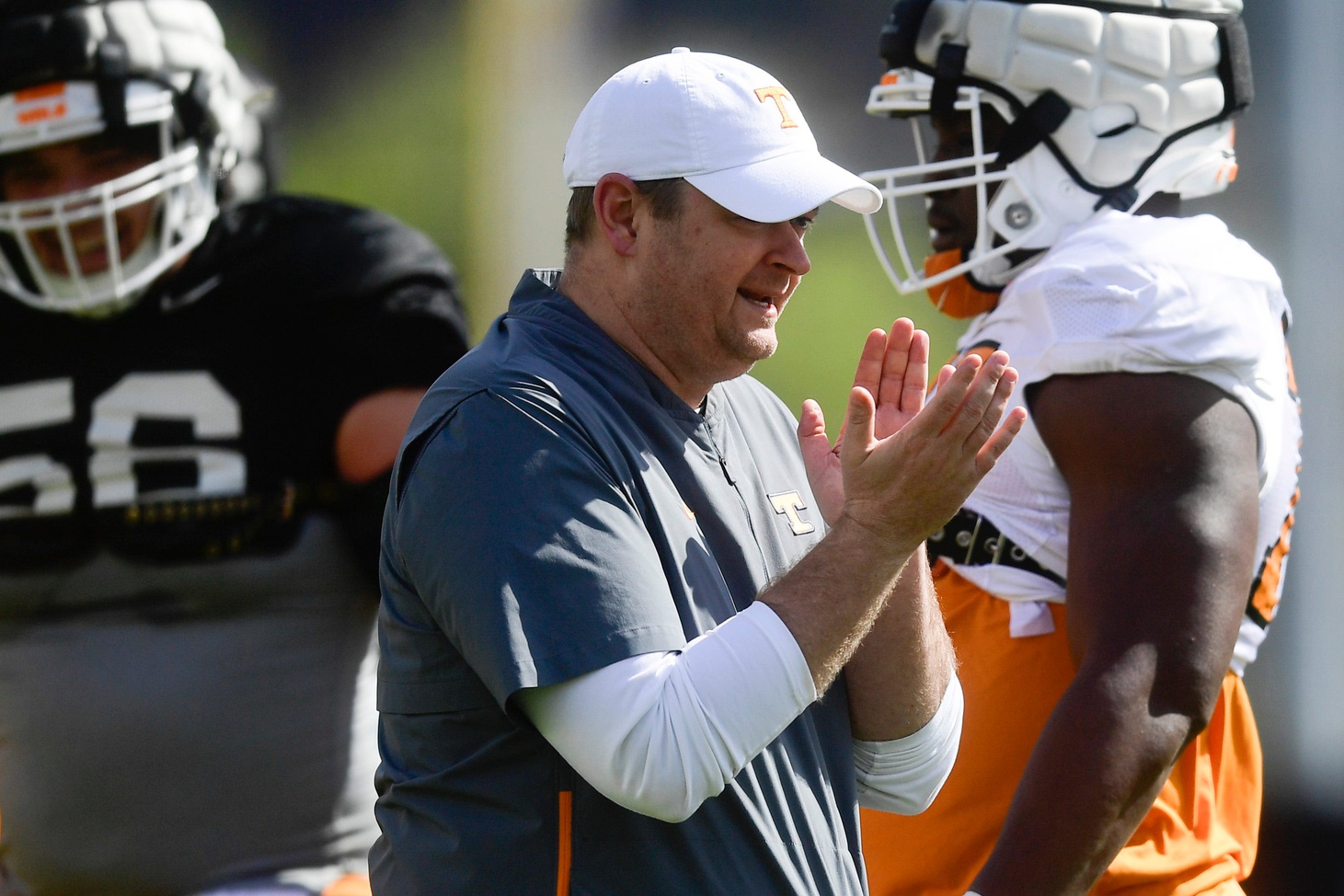
Can 2021 Tennessee be like 2020 Ole Miss? In Josh Heupel’s ideal scenario, absolutely
If you turned on an Ole Miss game in 2020, you were never disappointed.
You were treated to trick plays, flying play sheets, long touchdowns and a whole mess of points. Ole Miss games had a combined average of 77.5 points per game, which was easily the highest total in Power 5. Consider that the byproduct of having the nation’s No. 14 scoring offense … and No. 117 scoring defense.
From an entertainment standpoint, 2020 Ole Miss was a college football fan’s dream. Well, maybe not for the college football purist who wants 3 yards and a cloud of dust. But for the rest of us, Ole Miss was the ultimate “my team isn’t playing and I need a game to watch” squad. In Year 1 of the Lane Kiffin era, the brand of football — for better or worse — garnered national attention. Kiffin already looks like he’s having as much fun as any coach in America.
In Year 1 of the Josh Heupel era at Tennessee, Vols fans should hope to follow a similar blueprint. In fact, that’s the brand Heupel should strive to establish in 2021.
Don’t get it twisted. In Heupel’s ideal world, Tennessee’s defense doesn’t remind SEC fans of Ole Miss’ 2020 defense, which was mostly non-existent until the very end of the season when Otis Reese was eligible. But if you’re a Tennessee fan hoping for a defense resembling anything like we saw during the Jeremy Pruitt era, I’d say dial those expectations back a few notches.
Between the transfer portal and the loss of one of the sport’s better defensive minds, the deck is stacked against the Vols’ defense in Year 1. That’s also the case because it’s been well-documented that Heupel’s offense isn’t exactly known for playing “complementary football.”
Consider that all the more reason 2021 Tennessee needs to follow that 2020 Ole Miss path to relevance.
Does that mean Heupel is about to start firing play sheets into the Knoxville sky like Kiffin? Probably not. He doesn’t seem wired that way. But if his all-or-nothing offense can do the talking, that’ll suffice. We already saw in the spring game just how different the Vols are going to look from an identity standpoint. This unit will take plenty of downfield shots, regardless of who the starting quarterback is.
Let’s not forget that at this time last year, we didn’t know that Matt Corral was going to be the starting quarterback at Ole Miss. He had to beat out John Rhys Plumlee and work to truly master the Kiffin/Jeff Lebby offense.
Lebby, of course, is the link connecting 2020 Ole Miss and 2021 Tennessee. Kiffin poached him from Heupel’s UCF staff, and Ole Miss gave him a sizable raise after Year 1 amidst reports that Lebby was a serious candidate to replace Heupel at UCF. Now, Heupel is trying to find his right group of skill players to continue his streak of 3 consecutive top-10 offenses.
Hendon Hooker’s mobility is much closer to Plumlee, and while he might not quite have the gun-slinger mentality that Corral does, the Virginia Tech transfer is more than capable of stretching the field. Harrison Bailey showed off his ability to do that in the spring game, but questions remain about his mobility behind what could be a porous offensive line. Brian Maurer is a bit of the forgotten man, but he isn’t being ruled out, either, especially after he showed he could execute the downfield attack in spring.
Brian Maurer to Walker Merrill. pic.twitter.com/cU61MifZoa
— Trey Wallace (@TreyWallace_) April 10, 2021
And then there’s Joe Milton, who lost the starting job at Michigan because of accuracy issues but announced his transfer to Tennessee immediately at the conclusion of spring ball.
It was fair to wonder why exactly Milton joined Tennessee when it appeared that between Hooker, Bailey and Maurer, there were multiple options for Heupel. But when you think about it, it makes sense why Heupel is considering so many options.
It’s because not having someone to turn to isn’t an option.
If you’re Heupel, you have to sell this offense as fun and one that offensive skill-player recruits want to be a part of. Whether that’s 2022 5-star Alabama quarterback commit and Tennessee native Ty Simpson or 2023 5-star quarterback recruit Arch Manning, Heupel isn’t in “win now” mode, but his offense should be in “score now” mode.
Recruits like that aren’t flocking to the place with a mediocre passing offense for a 5-7 team.
Speaking of going 5-7 with an inconsistent passing attack, Tennessee could also remind us of a different Ole Miss team.
Remember those 2017-18 seasons with Shea Patterson and Jordan Ta’amu? They had good, not great offenses. Why? Even though they had D.K. Metcalf, A.J. Brown and Elijah Moore (he got there in 2018), they couldn’t score against elite SEC West teams. In 2017-18 games vs. Alabama, Auburn and LSU, Ole Miss averaged 14.8 points. Compare that to last year when Ole Miss scored 48 vs. Alabama and LSU, and 28 against Auburn. Kiffin’s group averaged 41.3 points against those teams.
One of the reasons Ole Miss was must-see TV in 2020 was because it felt like every game went down to the wire. Kiffin’s squad never lost by more than 2 scores.
Tennessee, on the other hand, is the team with 12 consecutive losses to its 3 biggest rivals (Alabama, Florida and Georgia) with the past 11 coming by at least 2 scores. Pruitt couldn’t flip that script. It’s ambitious to assume Heupel will do that with all the valuable contributors the Vols lost on both sides of the ball.
Then again, Heupel is going to run things differently than any offense led by Jim Chaney, Ty Helton or Larry Scott. Tennessee might not have a receiving corps nearly as loaded as any Ole Miss team in recent memory. I’d doubt there’s a target machine like the 2020 version of Moore, but Jimmy Calloway is intriguing, and former USC transfer Velus Jones should benefit most from an offense that actually throws past the sticks on 3rd down. Fortunately for Tennessee, it does at least have a proven offensive mind who already showed his offense could work in the SEC East.
Heupel’s 2016 Mizzou offense was certainly in the 2017-18 Ole Miss camp. It could light up weaker competition, but it struggled to sustain those home-run plays against quality competition. Heupel’s 2017 Mizzou offense, however, was a closer version to 2020 Ole Miss. After a slow start, Drew Lock took off in the latter half of the season and Mizzou put up 41.7 points per game on SEC competition in October and November.
Can Heupel repeat that type of season at Tennessee? In an ideal world, he will. So what if it means a 4-4 ceiling in SEC play? This year’s version of Tennessee isn’t competing for a division title. This year’s version of Tennessee is trying to turn a new, offensive-minded leaf.
Gone should be the days when Tennessee goes 216 minutes and 12 seconds without a passing play of 30-plus yards (that drought lasted a total of 7 weeks while Ole Miss had a 30-yard completion in every game). If Heupel’s offense has a drought half as long in Year 1, something has gone horribly, horribly wrong.
I wouldn’t bank on that, though. I’d instead bank on turning the TV on to watch 2021 Tennessee and being thoroughly entertained.
Connor O'Gara is the senior national columnist for Saturday Down South. He's a member of the Football Writers Association of America. After spending his entire life living in B1G country, he moved to the South in 2015.







